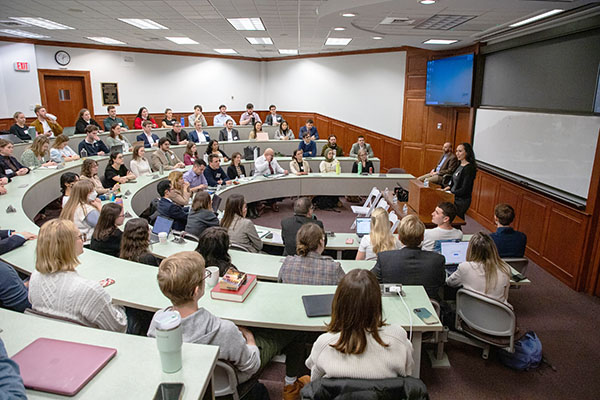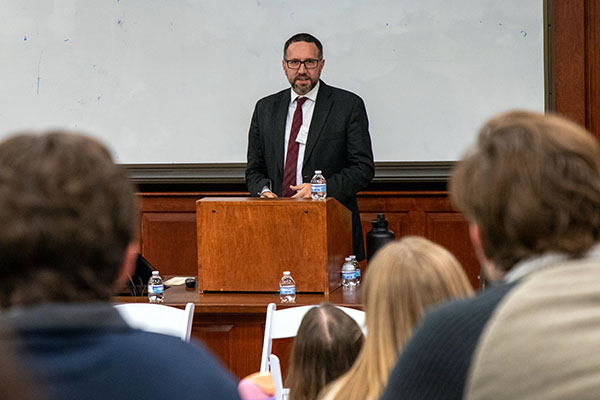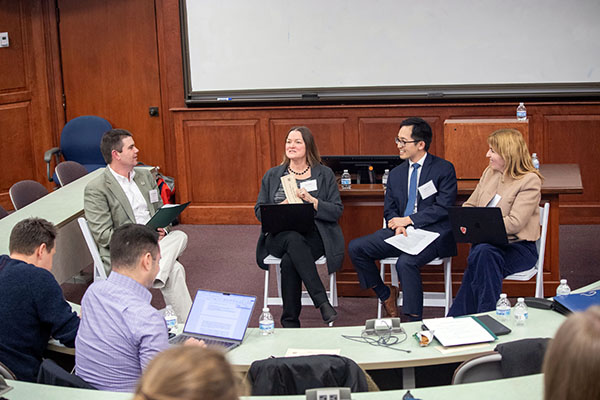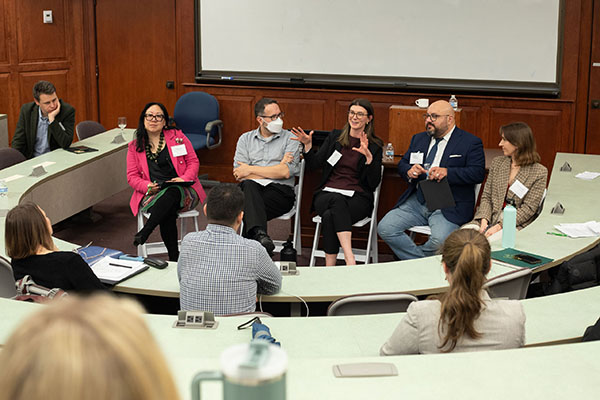William & Mary Law Review’s Spring Symposium Examines Housing Justice
On February 7-8, the William & Mary Law Review held its symposium for Volume 66, “Unhoused and Unprotected: Grants Pass and the Future of Housing Justice.” The student-run event explored the recent U.S. Supreme Court decision of Grants Pass v. Johnson and the future of housing rights advocacy.
The weekend kicked off on Friday with opening remarks from the Law Review’s Faculty Advisor, Professor Nathan Oman, and Volume 66 Editor-in-Chief, Anya Karaman ’25.
Joseph Mead of the Georgetown Law Institute for Constitutional Advocacy and Protection then provided the keynote speech. Mead served as counsel to the respondents in Grants Pass and co-authored the respondents’ brief opposing the city’s ordinances for exceeding Eighth Amendment limits on criminal punishment.
 During his keynote, Mead described the facts of Grants Pass as well as the limited scope of the plaintiffs’ arguments. He stressed that the Court relied on amicus briefs instead of record evidence, which was ultimately a process failure. He concluded with, "the rights of citizenship, the rights of humanity, they can be temporarily overlooked, abridged, denied, but they can never be annulled."
During his keynote, Mead described the facts of Grants Pass as well as the limited scope of the plaintiffs’ arguments. He stressed that the Court relied on amicus briefs instead of record evidence, which was ultimately a process failure. He concluded with, "the rights of citizenship, the rights of humanity, they can be temporarily overlooked, abridged, denied, but they can never be annulled."
The first panel, “Grants Pass and its Implications,” featured Professor Sara Rankin (Seattle University School of Law), Gregory Cui (MacArthur Justice Center), and Professor Mila Versteeg (University of Virginia School of Law), and was moderated by Professor Thomas McSweeney (W&M Law).
Panelists discussed the nonlegal contributors to Grants Pass, such as the housing and mass incarceration crises that set the stage, as well as legal precedents that led up to the Court’s decision.
The following morning, William & Mary Law School’s Eric Kades moderated a panel on “The Impact of Local Governance and Property Law on Homelessness.” Panelists included Professor Michael Pollack (Cardozo School of Law), Professor Ezra Rosser (American University Washington College of Law), and Brian Highsmith (Harvard Law Academic Fellow).
![]() The panel explored various ways in which local government and property law impact the rights of those who are experiencing homelessness, such as: the necessity defense’s plausible applicability to charges for illegal camping; how the governance of sidewalks impacts those experiencing homelessness; and how jurisdictional fragmentation makes formulating public policy around housing that much harder.
The panel explored various ways in which local government and property law impact the rights of those who are experiencing homelessness, such as: the necessity defense’s plausible applicability to charges for illegal camping; how the governance of sidewalks impacts those experiencing homelessness; and how jurisdictional fragmentation makes formulating public policy around housing that much harder.
The final panel of the weekend, “Paving a Path Forward After Grants Pass,” featured Scout Katovich (ACLU Trone Center for Justice & Equality), Joe Mead, Shelby Calambokidis (Georgetown Law Institute for Constitutional Advocacy and Protection), and William Knight (National Homelessness Law Center), and was moderated by Professor Margaret Hu (W&M Law).
This panel explored what legal avenues remain after Grants Pass, such as: the Americans with Disabilities Act; the 14th Amendment’s state-created-danger doctrine; the Due Process Clause; and the Dormant Commerce Clause.
The weekend concluded with closing remarks from the Law Review’s Volume 67 Editor-in-Chief, Laura Lasswell ’26.
About the Law Review
Since 1957, the William & Mary Law Review has published important scholarly work and has become one of the top general interest law journals in the country. Published six times per year—in October, November, February, March, April, and May—the Review is the oldest scholarly publication at the Law School and has featured the work of noted scholars in all areas of the law. Since 2016, the Review has expanded to include an online supplement that publishes additional original scholarship. The Review also serves as one of the five credit-bearing journals at the Law School. The publication of articles in the Review is managed by law students, who join the journal at the end of their first year through the annual Joint Journal Competition held each May. Learn more.